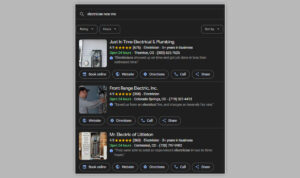In the world of email marketing, simplicity is key. Avoid overcomplicating your emails, and harness the power of anchor text to guide your readers seamlessly. Remember, a clear and concise email often leads to better engagement and conversions!

Table of Content
Introduction: The Email Jungle
Why Simplicity Wins in Email Marketing
- The Human Brain and Information Overload
- First Impressions Matter
The Dangers of Overcomplicating Your Emails
- Losing Your Audience’s Attention
- The Dreaded Unsubscribe Button
Anchor Text: The Hero of Email Simplicity
- What is Anchor Text?
- Why It’s Crucial for Email Marketing
- Best Practices for Using Anchor Text
Tips to Simplify Your Emails
- Content Clarity
- Design and Layout
- Call to Action (CTA) Placement
Fun Facts: Email Marketing Edition
Conclusion: Embrace the K.I.S.S. (Keep It Simple, Silly!) Principle
Introduction: The Email Jungle
Ah, the vast jungle of email marketing! Where the chirping of unread emails fills the air, and the predators (aka spam filters) lurk in the shadows. But fear not, dear marketer, for I’m here to guide you through this wild terrain with a tip as golden as the lost city of El Dorado: Avoid complicated emails!
Email Marketing Tip – Why Simplicity Wins in Email Marketing
The Human Brain and Information Overload
Our brains, magnificent as they are, have a limit to the amount of information they can process at once. When faced with a cluttered email, the brain goes into “nope” mode, and that email will likely end up in the trash.
So, keep it simple and give your reader’s brain a break!
Check our ,Featured Autoresponders
First Impressions Matter
You’ve got mere seconds to make an impression with your email. If your reader opens it and is bombarded with a chaotic mess of text, images, and links, they will bounce faster than a kangaroo on a trampoline.
The Dangers of Overcomplicating Your Emails
Losing Your Audience’s Attention
In today’s digital age, attention spans are shorter than a goldfish’s memory. If your email isn’t clear and to the point, you risk losing your audience faster than you can say, “click me!”
The Dreaded Unsubscribe Button
Make your emails too complicated, and that unsubscribe button will start looking mighty tempting to your readers. And once they’re gone, it’s tough to get them back.
Anchor Text: The Hero of Email Simplicity
What is Anchor Text?
Anchor text, dear reader, is the clickable text in a hyperlink. It’s the gatekeeper, the bridge, the… well, anchor, that holds the power to guide your readers to where you want them to go.

Why It’s Crucial for Email Marketing
Using anchor text effectively can declutter your email and provide a clear path for your readers. Instead of bombarding them with URLs, use anchor text to seamlessly integrate links into your content.
Best Practices for Using Anchor Text
Be Descriptive:
The Guiding Principle
Imagine being handed a map with vague labels. Confusing, right? The same goes for anchor text. It should act as a mini-map, guiding readers to relevant content.
Why It Matters:
- Trust Building: Readers are more likely to click on a link if they know where it’s leading.
- SEO Benefits: Descriptive anchor texts can improve your site’s search engine ranking by providing context to search engine crawlers.
Examples:
Instead of using “Read more” for an article about email marketing tips, use “Discover email marketing strategies.”
2. Keep It Short and Sweet:
The Art of Brevity
In the age of information overload, less is often more. Your anchor text should be concise yet informative.
Why It Matters:
- User Experience: Long anchor texts can be distracting and may disrupt the flow of your content.
- Mobile-Friendly: Shorter anchor texts are more accessible for mobile users, who might struggle to click on lengthy links.
Tips:
- Aim for 3-5 words for optimal length.
- Ensure the anchor text is very relevant to the linked content.
3. Avoid “Click Here”:
The Call for Creativity
“Click Here” is the equivalent of a worn-out welcome mat. It’s been overused to the point of becoming almost invisible to readers.
Why It Matters:
- Lacks Context: “Click Here” doesn’t provide any information about the linked content.
- Missed SEO Opportunity: Using generic anchor text misses out on the chance to boost SEO with relevant keywords.
Alternatives:
- “Learn more about [topic].”
- “Explore our guide on [topic].”
- “Dive deeper into [topic].”

Tips to Simplify Your Emails
Content Clarity
1. Be Direct:
The Straight Path to Understanding
In a world overflowing with content, verbosity is your enemy. Being direct ensures that your audience grasps your message without getting lost in a sea of words.
Why It Matters:
- Efficiency: Readers appreciate content that respects their time.
- Retention: Direct messages are easier to remember and recall.
Tips:
- Start with a clear objective for your content. What’s the primary message you want to convey?
- Edit ruthlessly. Once you’ve written your piece, go back and trim any unnecessary words or sentences.
2. Use Subheadings:
The Roadsigns of Your Content Highway
Subheadings act as signposts, guiding readers through your content and highlighting the main points. They break up large chunks of text, making it more approachable.
Why It Matters:
- Scannability: Many readers skim content. Subheadings allow them to quickly find the information they’re interested in.
- Organization: Subheadings help structure your content, making it more logical and coherent.
Tips:
- Ensure subheadings are descriptive and give a clear idea of the section’s content.
- Maintain consistency in style and tone for all subheadings.
3. Bullet Points Are Your Friend:
The Spice of Content Life
Bullet points break down complex information into bite-sized, easily digestible chunks. They’re perfect for lists, benefits, features, or any series of related points.
Why It Matters:
- Readability: Bullet points make content easier to read by providing visual breaks.
- Highlighting Key Points: They draw attention to essential information, ensuring it stands out.
How to Use Them Effectively:
- Start each bullet point with the same grammatical form (e.g., all nouns or all verbs).
- Keep bullet points concise and related to the same topic.
- Avoid overusing them. Too many bullet points can dilute their impact.
Design and Layout
A clean design can make your email look professional and easy to read. Use whitespace effectively, choose a readable font, and for the love of all things digital, avoid neon colors!
Call to Action (CTA) Placement
Your CTA is the star of the show. Place it prominently, but don’t go overboard. One clear CTA is often more effective than a dozen scattered ones.
Fun Facts: Email Marketing Edition
- Did you know that Tuesdays have the highest email open rates?
- Can you imagine the average office worker receiving more than 100 emails daily? No wonder simplicity is key.
- Using a subjectline with the word “video” in your email could boosts open rates by 19%.
Conclusion: Embrace the K.I.S.S. (Keep It Simple, Silly!) Principle
In the grand theater of email marketing, simplicity often steals the show. By avoiding complicated emails and harnessing the power of anchor text, you’re setting the stage for success.
So, take a bow, dear marketer, and let the standing ovations (or conversions) roll in!
Thanks for reading
Laurence Zimmermann
Join my VIP Inner Circle on the fractalmax.com Hub, you’ll access our live events about online business, affiliate marketing, marketing strategies, finance and more.
More information about our Web Design services and pricing here.
Related articles:
50 Inspirational Business Quotes to Boost Your Motivation
Overcoming Obstacles: 100+ Failure Quotes To Keep You Moving Forward
50+ inspirational and Motivational Quotes to Help You Increase Your Focus
120+ Best Productivity Quotes to Inspire and Motivate You
Embracing Change: Quotes About Change And Adaptation
Source: fractalmax.agency



